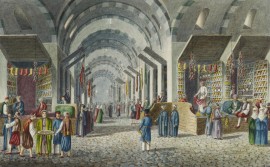- Fecha(s): 18/07/2017
- Lugar: Sala de Seminarios (Edificio Torretamarit), Universidad Miguel Hernández (Campus de Elche) . Se grabará.
- Ponente: Gloria Fiestras Janeiro, Universidad de Vigo

Abstract Los juegos TU como funciones de particiones son estructuras apropiadas para modelizar las ganancias/costes de una coalición teniendo en cuenta como se organizan el resto de los jugadores. En esta charla revisaremos algunos valores propuestos en la literatura, centrándonos en sus propiedades. En particular, revisaremos el valor de Myerson (Myerson 1977), el valor de…
- Fecha(s): 11/07/2017
- Lugar: Sala de Seminarios (Edificio Torretamarit), Universidad Miguel Hernández (Campus de Elche) . Se grabará.
- Ponente: Magdalena Kapelko, Wroclaw University of Economics, Institute of Applied Mathematics, Department of Logistics

Abstract This paper extends the measurement of dynamic productivity change over time to provide its full decomposition into economically meaningful components in the Data Envelopment Analysis framework. The dynamic approach accounts for dynamics of production decisions via adjustment costs and is visualized as a dynamic Luenberger productivity change indicator. The paper also estimates the dynamic…
- Fecha(s): 16/06/2017
- Lugar: Seminario del Departamento de Métodos Cuantitativos para la Economía y Empresa, UMU. Retransmisión en directo.
- Ponente: Germán López. Universidad Católica de San Antonio Murcia
Abstract This paper studies the evolution of the monetary policy transmission mechanisms in the US after the financial crisis and the extraordinary monetary stimulus applied since 2008. The implementation of a modified Dynamic Factor Model allows the identification of two different structural scenarios based on the information contained in a large dataset of 110 variables….
- Fecha(s): 16/06/2017
- Lugar: Sala de Seminarios (Edificio Torretamarit) UMH (Se grabará)
- Ponente: Priscila Lopes, Universidade Federal do Rio Grande do Norte, Natal (Brazil)
- Porconfirmar: 1
Brazil is proportionally a relatively unimportant player in the world fisheries scenario. However, small-scale fisheries (SSF) specifically are crucial for local livelihoods and the food security of millions of people, both on the coast and inland. Such fisheries provide more than 50% of the total Brazilian catches, suggesting that they can be highly impacting on…
- Fecha(s): 12/05/2017
- Lugar: Seminario B2/02, Departamento de Fundamentos del Análisis Económico. Se retransmitirá y se grabará.
- Ponente: Miguel González Maestre

Abstract In a two-sector economy, we consider the endogenous determination of the level of competition in the imperfectly competitive sector, under democratic, non-manipulated voting. In the context of the Salop’s (1979) circular model, we identify conditions such that besides a competitive equilibrium (with most voters choosing the efficient level of transport cost), a «populist» equilibrium…
- Fecha(s): 11/05/2017
- Lugar: Seminario del Departamento de Economía Aplicada. Facultad de Economía y Empresa (retransmitido en streaming).
- Ponente: Seven Agir

Abstract What are the implications of legal rules for growth and business expansion? This question has been at the center of the rich literature that explores the link between legal institutions and economic performance. While the scholarship has provided insights on the differential experience of countries which developed their own legal systems and those that…
- Fecha(s): 11/04/2017
- Lugar: Sala Seminarios (Edificio Torretamarit), Universidad MIguel Hernández de Elche. Se grabará.
- Ponente: El-Ghazali Talbi (University of Lille 1).

Abstract During the last years, interest on hybrid metaheuristics has risen considerably in the field of optimization and machine learning. The best results found for many optimization problems in science and industry are obtained by hybrid optimization algorithms. Combinations of optimization tools such as metaheuristics, mathematical programming, constraint programming and machine learning, have provided very…
- Fecha(s): 06/04/2017
- Lugar: Sala de seminarios, Edificio Torretamarit, Universidad Miguel Hernández (Campus de Elche). Se grabará.
- Ponente: José Manuel Giménez-Gómez (Universitat Rovira i Virgili)

Abstract An effective climate agreement is urgently required, yet conflict between parties prevails over cooperation. Thanks to advances in science it is now possible to quantify the global carbon budget, the amount of available cumulative CO2 emissions before crossing the 2oC threshold (Meinshausen et al., 2009). Countries carbon claims, however, exceed this. Historically such situations have been tackled…
- Fecha(s): 03/04/2017
- Lugar: Seminario del Departamento de Economía Aplicada
- Ponente: Ricardo Salvatore

Resumen El trabajo examina la evolución de la “desigualdad nutricional” a largo plazo en Argentina. Definimos la “desigualdad nutricional” como las diferencias inter-personales al acceso a la nutrición y la salud en primera infancia. Este ensayo presenta los resultados de varias muestras de población (reclutas y presos) de diversas regiones de la Argentina. La pregunta…
- Fecha(s): 30/03/2017
- Lugar: Seminario del Departamento de Métodos Cuantitativos para la Economía y Empresa, UMU. Retransmisión en directo.
- Ponente: Montserrat Viladrich Grau. Universidad de Lleida

Abstract Much biodiversity is found in farm land. However, there is usually a trade-off between farm land productivity and sustainability of natural resources. Biodiversity conservation in agricultural land usually requires to carry on a series of conservationist practices that are costly. Therefore, farmer’s participation in conservationist programs requires economic incentives. Our goal is to identify…









